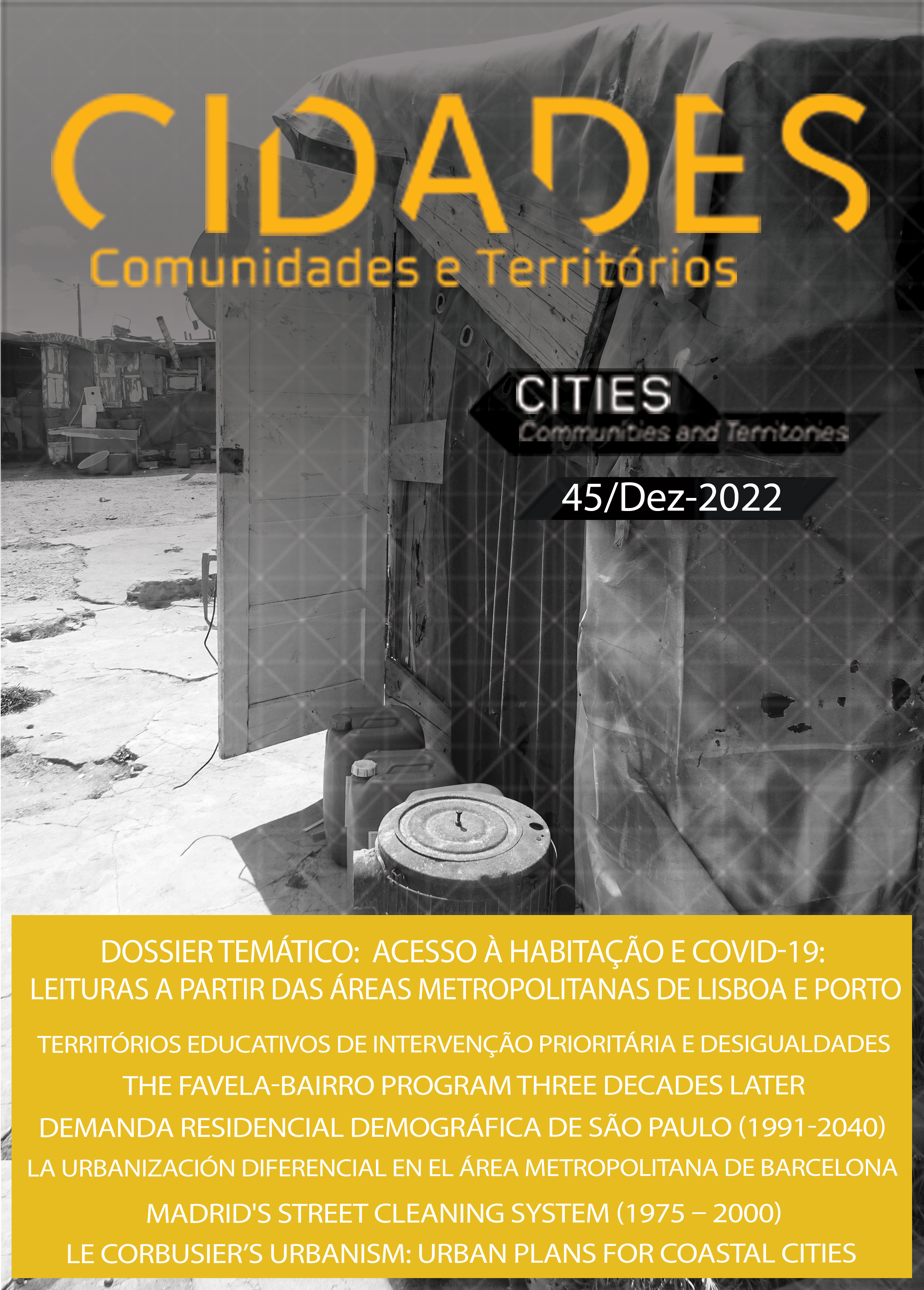Sustentabilidade e eficiência no uso de recursos em Portugal
Os impactos do PO SEUR (2014-2020)
Mots-clés :
PO SEUR, Territorial Impact Assessment, Environmental Sustainability, Climate adaptations, Low-Emissions Economy.Résumé
Vivemos numa era com preocupações globais crescentes no domínio da sustentabilidade ambiental. A sensibilidade institucional e social para a proteção ambiental é particularmente relevante no território da União Europeia (UE). Neste particular, a Política de Coesão destina uma parte significativa do seu pacote financeiro para concretizar objetivos de políticas estratégicas que concretizem um apoio proactivo à concretização de processos de desenvolvimento territorial ambientalmente sustentáveis. Em Portugal, o PO SEUR - Programa Operacional Sustentabilidade e Eficiência no Uso de Recursos – tem atuado como um instrumento privilegiado de suporte ao desenvolvimento sustentável. Neste artigo, foi utilizada uma metodologia de avaliação de impactos para avaliar a implementação do PO SEUR (2014-2020) em Portugal continental em cinco dimensões de análise: (i) Economia com baixas emissões; (ii) Adaptação às Alterações Climáticas; (iii) Prevenção e Gestão de Riscos; (iv) Proteção Ambiental e (v) Eficiência dos Recursos. Com base nos dados recolhidos, foi possível verificar que, em geral, o PO SEUR teve um impacto positivo na sustentabilidade e eficiência no uso de recursos em Portugal Continental no período de 2014-2020. Contudo, esse impacto variou, de forma geral, entre os impactos baixos e os moderadamente positivos. Neste particular, destaca-se os impactos positivos mais elevados na dimensão ‘adaptação às alterações climáticas’ e os menos positivos na dimensão ‘economia com baixas emissões’.
Références
AD&C (2018) Relatório do Desenvolvimento e Coesão, Agência para o Desenvolvimento e Coesão, Lisboa.
APA (2016) Plano Nacional da Água, Agência Portuguesa do Ambiente, Lisboa.
APA (2019) Roteiro para a neutralidade carbónica 2050. Agência Portuguesa do Ambiente, Lisboa.
BP (2020) BP Statistical Review of World Energy (69th Edition), British Petroleum, London
CE (2001) Desenvolvimento Sustentável na Europa para um mundo melhor: Estratégia da União Europeia em favor do desenvolvimento sustentável, Comissão Europeia, Bruxelas.
CE (2010) Estratégia Europa 2020, Comissão Europeia, Bruxelas.
CE (2011) Política de Coesão da UE 2014-2020: direcionar os investimentos para as principais prioridades de crescimento, Bruxelas
CE (1999) MEANS – Evaluation socio-economic programmes – Evaluating Design and Management, Volume 1 — Comissão Europeia, Luxemburgo.
CE (2009) Impact Assessment Guidelines, 15 Janeiro de 2009, Comissão Europeia, Bruxelas
CE (2017) My Region, My Europe, My Future. 7th Report on Economic, Social and Territorial Cohesion, European Commission, Brussels.
CE (2013) EVALSED - The resource for the Evaluation for Socio-Economic Development, September 2013, European Commission, Brussels.
CE (2019) A European Green Deal, European Commission, Brussels.
CE (2020) Circular Economy Action Plan: For a cleaner and more competitive Europe, European Commission, Brussels
CE (2021) Forging a climate-resilient Europe - the new EU Strategy on Adaptation to Climate Change, European Commission, Brussels.
CE (2022) Cohesion in Europe towards 2050. 8th Report on Economic, Social and Territorial Cohesion, European Commission, Brussels.
DGEE (2013) Plano Nacional de Ação para a Eficiência Energética – 2013-2026 (PNAEE), Direção-Geral de Energia e Geologia, Lisboa.
DGEE (2015) Plano Nacional de Ação para as Energias Renováveis - PNAER 2020. Direção-Geral de Energia e Geologia. Lisboa
EIA (2021) Nuclear Explained: Nuclear Power and the Environment, Energy Information Administration, Washington
ESPON (2012) Territorial Impact Assessment of Policies and EU Directives. A practical guidance for policymakers and practitioners based on contributions from ESPON projects and the European Commission, ESPON, Luxembourg.
Fitzgerald, J. (2010) Emerald Cities: Urban Sustainability and Economic Development, Oxford University Press
Hanna, K. (ed.) (2022) Routledge Handbook of Environmental Impact Assessment, Routledge, New York
ICNF (2017) Plano Nacional de Defesa da Floresta contra Incêndios. Instituto de Conservação da Natureza e Florestas, Lisboa.
IPCC (2022) Climate Change 2022: Impacts, Adaptation and Vulnerability, Intergovernmental Panel on Climate Change, Geneva.
Lapeña, B., Wijnberg, K., Hulscher, S., Stein, A. (2010) Environmental impact assessment of offshore wind farms: a simulation-based approach, Journal of Applied Ecology, 47, 1110–1118.
Medeiros, E. (2016) Territorial Cohesion: An EU Concept, European Journal of Spatial Development, 60, http://www.nordregio.org/publications/territorial-cohesion-an-eu-concept
Medeiros, E. (2019) Spatial Planning, Territorial Development and Territorial Impact Assessment. Journal of Planning Literature, 34(2), 171–182
Medeiros, E. (2018) The Age of Sustainable Development, by Jeffrey D. Sachs, Journal of Geography, 118(1), 49–50.
Medeiros E. (ed.) (2020a) Territorial Impact Assessment. Advances in Spatial Science (The Regional Science Series). Springer, Cham.
Medeiros, E. (2020b) Portugal 2020. An effective policy platform to promote Sustainable Territorial Development?, Sustainability, 12(3), 1126.
PNEC (2019) Plano Nacional Energia e Clima 2021-2030. Portugal Energia. Lisboa.
Presidência do Conselho de Ministros (2013) Resolução do Conselho de Ministros nº 20/2013, Diário da República – (1º série; nº70)
Presidência do Conselho de Ministros (2015), Resolução do Conselho de Ministros nº 6-B/2015, Diário da República (1ºsérie, Nº24)
Presidência do Conselho de Ministros (2018), Resolução do Conselho de Ministros nº 55/2018, Diário da República (1º Série, Nº87)
Sachs, F. (2015) The age of sustainable development, Columbia University Press, New York
Sang-Hyo, K., Moon-Seock, C., Ho-Seong, M., Jung-Yeun, J. (2013) Environmental impact assessment and eco-friendly decision-making in civil structures, Journal of Environmental Management, 126, 105–112.
Ta-Kang, L., Haw-Yang, S., Chung-Ning, T. (2013) Environmental impact assessment of seawater desalination plant under the framework of integrated coastal management, Desalination, 326, 10–18.
UN (1987) Report of the World Commission on Environment and Development: Our Common Future, United Nations, New York.
UN (2015) Integrating the Three Dimensions of Sustainable Development: A framework and tools, United Nations, New York.
UN (2018) United Nations Environment Programme: Annual Report 2018, United Nations, New York.
Téléchargements
Publié-e
Numéro
Rubrique
Licence
© Eduardo Medeiros 2021

Cette œuvre est sous licence Creative Commons Attribution - Pas d'Utilisation Commerciale - Pas de Modification 4.0 International.
CIDADES, Comunidades e Territórios by DINÂMIA'CET-Iscte is licensed under a CC-BY licence.






